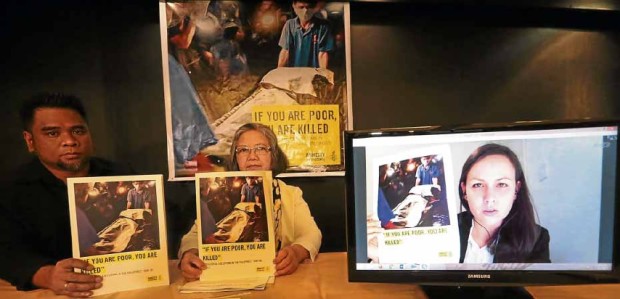
REPORT ON DRUG KILLINGS Amnesty International Philippines campaigner Wilnor Papa, board trustee Sister Maria Vida
Cordero and London-based researcher Rachel Choa-Howard present their group’s report on extrajudicial killings triggered by the government’s campaign against illegal drugs. They say the killings may constitute crimes against humanity. —GRIG C. MONTEGRANDE
Senators Richard “Dick” Gordon and Panfilo “Ping” Lacson are reluctant to open an immediate investigation of allegations by Amnesty International that the Philippine National Police paid its own officers and hit men to kill drug offenders.
The two senators, who had closed an earlier inquiry into extrajudicial killings in President Rodrigo Duterte’s war on drugs, said on Thursday that the London-based group must show more proof to back its allegations before the Senate launches its own inquiry.
They were reacting to plans by Sen. Chiz Escudero to call to a Senate hearing representatives of the human rights watchdog, which released a report on the paid killings on Wednesday, to “explain the basis” of their own investigation.
Escudero said the Senate needed to find out if the report had basis “because this is damaging to the country’s image.”
He said he would file a resolution next week seeking a Senate inquiry, which could be handled by the justice and human rights committee chaired by Gordon or the committee on public order and dangerous drugs headed by Lacson.
Police data show at least 7,669 people have been killed since Mr. Duterte unleashed his war on drugs seven months ago. A total of 2,555 people were killed in police operations.
Onus is on Amnesty
In separate statements, Lacson and Gordon indicated that they were not ready to immediately jump into an inquiry.
“The Senate should not be used to fish for evidence on the basis of that report,” Lacson said.
He said the “onus is on Amnesty International to substantiate their accusations against our government and the PNP” and show “clear evidence.”
Among a litany of alleged crimes, Amnesty accused police of killing defenseless people, fabricating evidence, paying assassins to murder drug addicts and stealing from those they killed or from the victims’ relatives.
Amnesty said an active-duty policeman regularly paid two assassins P5,000 for each alleged drug user killed and P10,000 to P15,000 for an alleged pusher.
It added that an officer had admitted receiving P8,000 to P15,000 per “encounter” and that there was no incentive to make arrests.
The report said Mr. Duterte had incited the police to carry out a murderous war on the poor, and warned that the International Criminal Court would need to start investigating if Philippine authorities did not stop it soon.
In a text message to the Inquirer, Lacson said he had advised Escudero to first read the 66-page report before filing his resolution.
Fishing expedition
“If (Amnesty) can show convincing proof of their allegations, by all means, we as lawmakers just like any patriotic Filipino, should condemn the PNP and do something about it,” Lacson said.
“On the other hand, if they can’t substantiate, we should all stand up and defend the dignity and honor of our country, our government as well as our police force,” he added.
Gordon said he favored an investigation but did not want “a fishing expedition.”
“I want to investigate but you have to give me documents that can connect it to higher-ups. Otherwise, it’s a murder investigation. Let the police do its job,” he said in a phone interview.
Escudero said he wanted Amnesty representatives to testify to identify those responsible for what could be a conspiracy to commit murder.
“This is important for me because this will be an opportunity for the PNP to air its side and dispute (the report) if the allegations of (Amnesty) are false,” he said.
‘Not state-sanctioned’
In a statement, presidential spokesperson Ernesto Abella said the government did not tolerate summary executions.
“The extrajudicial deaths are not state-sanctioned,” he said, without validating the Amnesty report. “The reforms in the PNP will rid the force of rogue cops.”
Mr. Duterte has said he will deploy the military to assist the police, calling illegal drugs a “national security threat.” —WITH REPORTS FROM MARLON RAMOS, DONA Z. PAZZIBUGAN, LEILA B. SALAVERRIA AND AFP